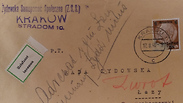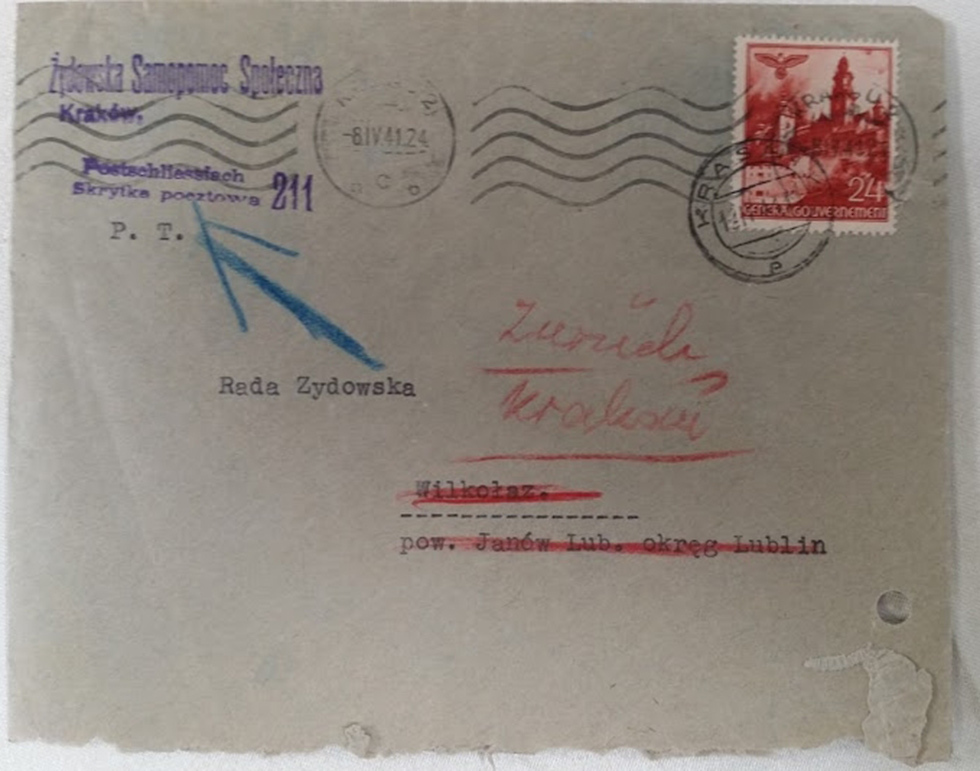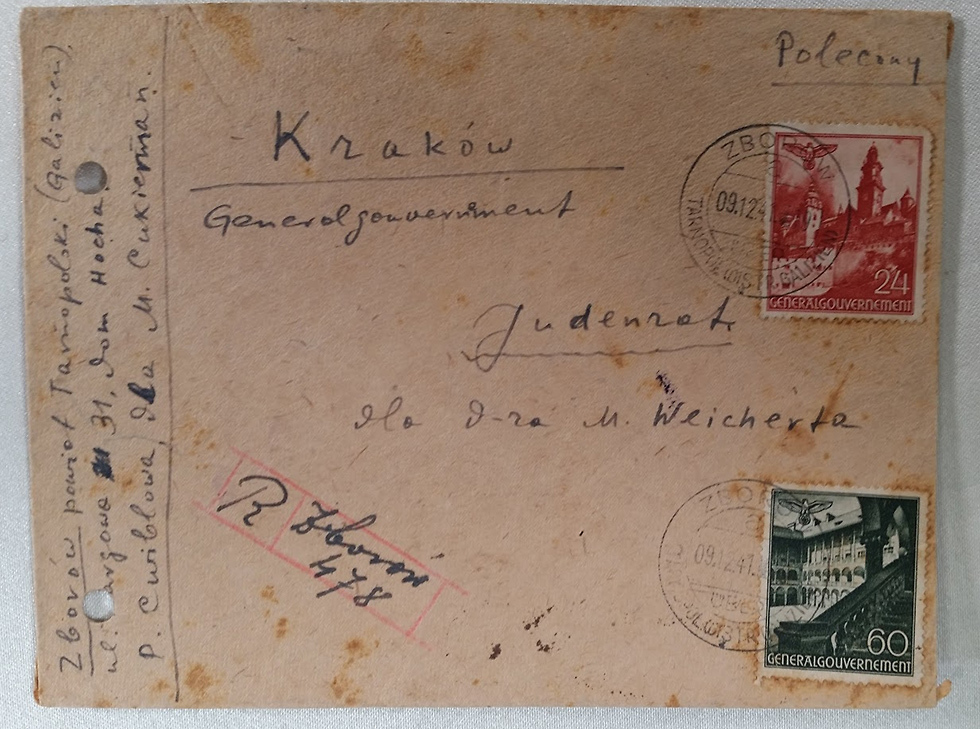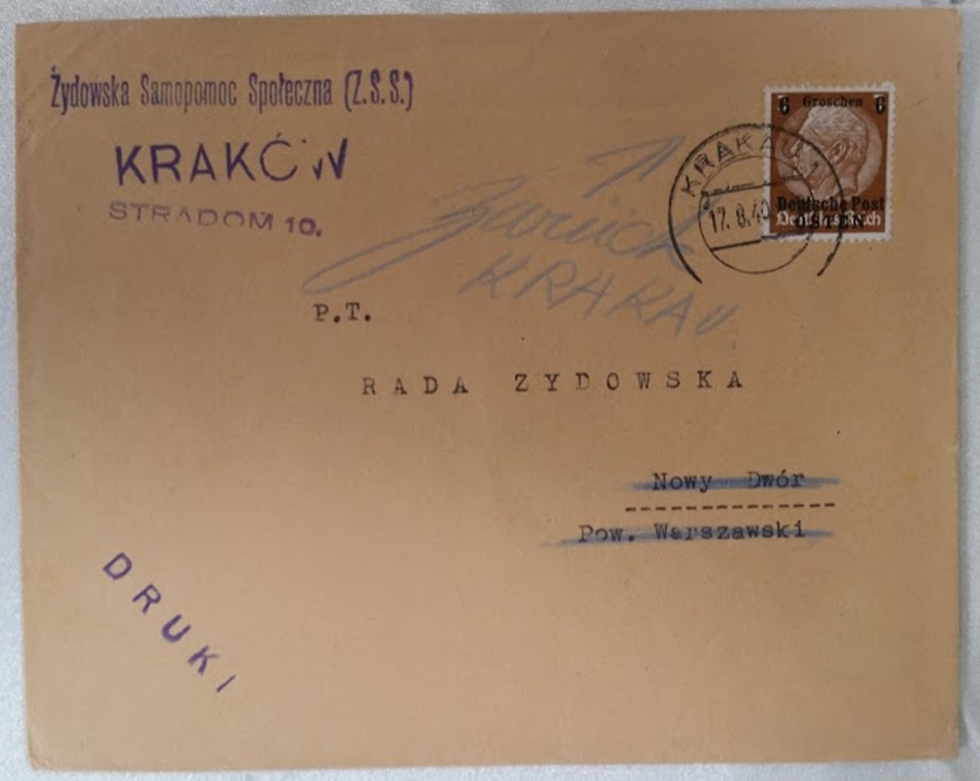

Envelopes reveal Polish support for Nazis during World War Two
Missives collected by Jewish organization head Michał Weichert in World War Two Poland reveal writings scribbled by Polish postmen on envelopes he had sent his organization's branches; inscriptions include 'The Jew no longer exists' and 'The Jews have been expelled'; envelopes revealed by Jerusalem's National Library following Polish death camp bill controversy.
The National Library of Israel unveiled Monday a collection of 59 bone-chilling letters sent to the different branches of a Jewish social assistance organization from the organization's Krakow chairman Michał Weichert, on the backdrop of the contentious Polish bill outlawing references to "Polish death camps."
Weichert's organization, Yidishe Sotsyale Aleynhilf—meaning "Jewish Social Self-Help"—was a legal organization that organized aid for Jews in camps and ghettos during World War Two.
The letters in question were mailed between September 1940 and May 1941 in order to try and ascertain the situation in Jewish communities across Poland, but the country's mail service returned them to sender adding various handwritten comments on the envelopes, which deftly point to Polish collaboration with the Nazi regime.
Among the inscriptions written on the envelopes by Polish mailmen were remarks such as "The Jew no longer exists," "The Jew has left the address," "The Jews have been expelled," and "The Jewish council no longer exists."
It seems reasonable to assume, then, that the Polish mailmen were well aware of what befell the letters' recipients when they returned them to sender with the aforementioned remarks.
Weichert was shaken by the returned letters, surmising that the mailmen's remarks hinted at the annihilation of an entire community.
The envelopes, some of which were stamped in Polish with "Victory for the Germans on all fronts!", were taken by Weichert as proof of many Poles' collaboration and unequivocal identification with the Nazis' goals and actions.
The organization's head therefore decided to secrete the missives in a hiding place, along with additional documentation from the same period. When the war ended, he removed the material from its hiding place and added it to his personal archive.
While his archives were transferred to the National Library some 50 years ago, the collection of envelopes remained in his family's hands and only last April did Michał's son Yosef Weichert decide to hand them over to the National Library as well.
"Now is the time to deliver these historical items into your hands," the junior Weichert told the National Library officials. "It's important for the world to know the story and remember and be aware that Poles took part in the Germans' cruel actions during the Holocaust, and for everyone to know of their horrors."
The Jewish Social Self-Help organization that Weichert founded was based in Krakow and starting May 1940 disseminated funds raised by the American Jewish Joint Distribution Committee in the United States to Poland's Jewish communities, with German assent.
Alongside Weichert, the organization's administration also included Marek Bieberstein, head of the Krakow Ghetto's Judenrat. The organization's relatively close ties to the Nazi authorities were considered by many to be deplorable, and at the end of the war caused Weichert to be accused of collaborationism himself.
The allegations greatly wounded Weichert, who then devoted many years to clearing his name and proving his innocence.
Weichert, his wife, and son survived the Holocaust, and came to Israel in 1958 carrying a large and invaluable trove of uniquely important documentation for Holocaust studies.
The envelopes of the letters returned to Weichert from the different branches of the organization he headed were unassailable testimony as to the period's events, as it was effectively the Polish mailmen who notified Weichert of successive Jewish communities being decimated all across Poland.
The letters are now preserved at the National Library, where they are available for researchers and historians.


















